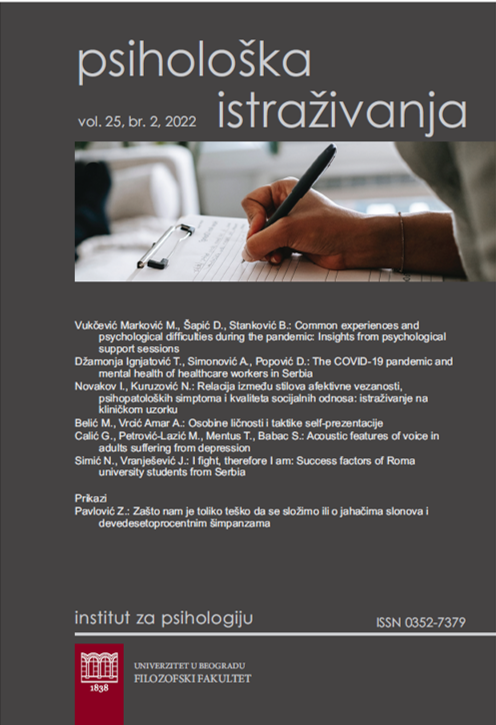Relacija između stilova afektivne vezanosti, psihopatoloških simptoma i kvaliteta socijalnih odnosa: istraživanje na kliničkom uzorku
The relationship between attachment styles, psychopathology and quality of social interaction: A study on a clinical sample
Author(s): Ivana Novakov, Nikolina KuruzovićSubject(s): Social Sciences, Psychology, Clinical psychology
Published by: Филозофски факултет, Универзитет у Београду
Keywords: attachment styles; social relationships; quality of social interaction; psychopathology;
Summary/Abstract: The aim of this study is to examine the differences between four attachment styles in relation to symptoms of psychopathology and the quality of social interaction, as well as to determine the role of attachment and psychopathology in predicting positive and negative social exchange. A total of 57 participants from the neuropsychiatric department of the Service for Specialist-Consultative Health Activities of the Health Centre in Novi Sad took part in the research. Respondents were mostly female(61%), aged 17 to 68 (M=40.13, SD=12.35). The Relationship Questionnaire (RQ) was used for attachment styles assessment. Psychopathological symptoms were measured using the Cornell Index (CI-N4), and the quality of social relationships was evaluated via the Network of Relationship Inventory (NRI). The highest rate of symptoms was detected in subjects with a preoccupied style, followed by those whose style was identified as fearful. The same two styles showed the least positive social exchange. Statistically significant differences on most scales from CI-N4 were found mainly between the secure and preoccupied subjects, while subjects with the avoidant pattern did not demonstrate significant differences in psychopathology and social functioning compared to secure participants. Secure affective attachmentand low aggressive-antisocial indicators (impulsiveness, aggression, and paranoia) were the most important predictors of positive social exchange. Understanding psychopathological manifestations of different insecure attachment styles can contribute to the efficiency of psychodiagnostic and psychotherapeutic processes. Furthermore, the fact that insecure attachment and aggressive-antisocial factor predominantly compromise positive social interaction can facilitate goal setting during psychological treatment within the clinical spectrum.
Journal: Psihološka istraživanja
- Issue Year: 25/2022
- Issue No: 2
- Page Range: 133-164
- Page Count: 31
- Language: Serbian

